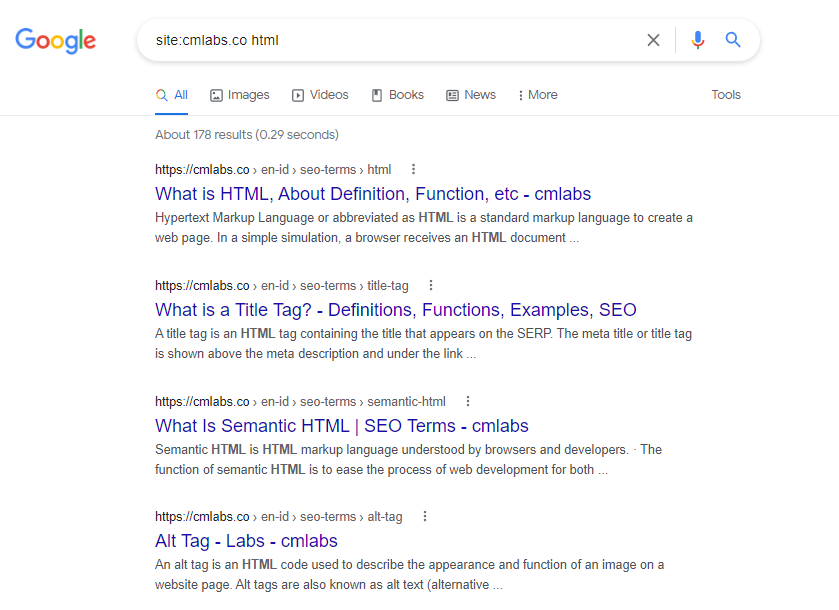We use cookies
This site uses cookies from cmlabs to deliver and enhance the quality of its services and to analyze traffic..
We use cookies
This site uses cookies from cmlabs to deliver and enhance the quality of its services and to analyze traffic..
Last updated: Nov 22, 2022

Disclaimer: Our team is constantly compiling and adding new terms that are known throughout the SEO community and Google terminology. You may be sent through SEO Terms in cmlabs.co from third parties or links. Such external links are not investigated, or checked for accuracy and reliability by us. We do not assume responsibility for the accuracy or reliability of any information offered by third-party websites.

Every web owner wants all their pages to rank high in search engines. They often have the same target keyword across multiple pages to get more impressions. However, having multiple pages targeting the same keyword can confuse the search engine.
The reason is simple, you are forcing your pages to compete against each other on the SERP. As a result, each page has a lower CTR, less authority, and a lower conversion rate than the others. Learn more about keyword cannibalization here.
Keyword cannibalization is a condition that occurs when you target the same keywords on multiple pages on a website. The thing that causes this issue may be due to similar article topics so that web owners or content writers intentionally or unintentionally target the same keywords.
For example, you have used the keyword "how to optimize a website" in article A, then you create article B containing the same target keyword. The two articles will compete for the top position in the SERP. It will prevent Google from determining which articles are the most relevant and deserve a high ranking.
The practice of keyword cannibalization can reduce a website's performance and rank in organic search. Therefore, you should avoid it for the sake of site performance. In addition, you need to understand some of the effects that keyword cannibalization will have.

Some of you may have thought that two articles with the same keywords can bring more traffic to your site. However, in reality, it has a bad impact on SEO implementation.
The effects of the cannibalization issue on a site are as follows:
As we know that page relevance is affected by the similarity between the keywords and search queries. If you create multiple articles with the same keywords, Google will determine which articles are the most relevant. Unfortunately, if the content is too similar, Google may have a hard time choosing the right content.
Let’s say you have two articles targeting the same keywords. If one of the articles that has a higher conversion rate ranks lower in Google's SERP, it could result in a huge loss for your site. Because you will lose the traffic which results in a high conversion rate.
The existence of cannibalization makes the click-through rate (CTR) divided into several pages containing the same keywords. A low CTR indicates a low number of clicks or visits to an article.
If you have created a high-quality article but have a low CTR, search engines will consider the article to be less relevant to user demand. As a result, search engines will lower the ranking of the article.
The lower the rank of the article, the less likely your article will be visited by internet users. It will endanger the credibility of your articles and website. That's what makes cannibalization can reduce page authority or page authority.
Some people accidentally conduct cannibalization and are not aware of its effect on websites. As a result, their website may experience decreased traffic, conversion rates, and even page authority. This is why it is important for web owners to check the keywords used in all website posts.
Here's how to spot keyword cannibalization to help you check the presence of the same keyword target.
Performing a content audit is one way to spot keyword cannibalization. Do a thorough content audit and see if you've ever created content targeting similar or the same keywords.
If there is cannibalization, you can optimize it by changing the same keywords into different content.
Google Search Console is one of the tools you can use to identify cannibalization. You can open the Performance menu, then go to the “pages” tab. GSC will return a list of URLs for your search query. If there is more than one URL with the same keyword, this could be due to a cannibalization issue.
Another way to find keyword cannibalization is to write the search query “site:[domain] keyword” in the Google search engine. In no time, Google will display a list of pages relevant to that keyword. Take a look at the site:search example below:

Keyword cannibalization is characterized by the presence of several articles with similar target keywords. If the search results show cannibalization on your website, then you need to fix it immediately. This way, you will avoid the bad effects.
After knowing how to spot keyword cannibalization, then you also need to know how to fix the issue. To fix the cannibalization issue, you can follow these ways:
One of the easiest ways to fix keyword cannibalization is to delete one of the articles that have the same keyword. After successfully deleting, you can redirect to the cannibalized page.
The rel="canonical" tag is often used to avoid any indication of duplication by search engines. It can be the best option for retaining pages that have multiple similar or cannibalized keywords.
The canonical URL will instruct search engines to crawl and index that URL, not anything else. So, even if there are multiple articles with the same keyword, Google will only crawl and index the articles for which you have added the rel="canonical" tag.
If there is a condition that does not allow you to delete or redirect the cannibalized page. Another solution to fix keyword cannibalization is to apply the rel="noindex" tag on all similar pages, except on the main page you want to be indexed.
With this approach, all the similar pages will remain on your site. However, only one page will be re-indexed to resolve the cannibalization issue.
The last way to fix keyword cannibalization is to re-optimize the page. You can apply on-page SEO strategies to solve the cannibalization problem.
For example, you can use variations of target keywords, optimize metadata (title tags, meta descriptions, and more), use unique page structures (varies text in heading tags), and so on.
Well, that is the explanation related to keyword cannibalization starting from the definition, effects, how to spot it, and how to fix it. This issue should be avoided as it can adversely affect website performance. To avoid such cannibalization effects you need to carry out content audits and improvements regularly.
WDYT, you like my article?